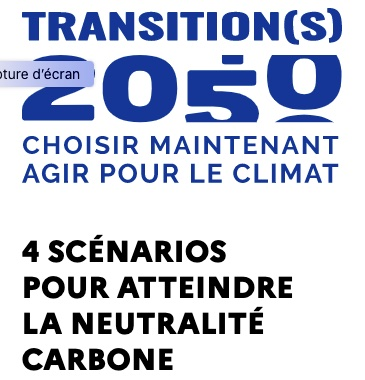To this end, ADEME is submitting four scenarios for debate, four "typical", coherent and contrasting paths to lead France towards carbon neutrality: "Frugal Generation", "Territorial Cooperation", "Green Technologies", "Restorative Bet".
"This unprecedented foresight exercise is based on two years of development work, the mobilization of a hundred or so ADEME employees and regular exchanges with a scientific committee and external partners and service providers who are specialists in different fields.Four scenarios
The four scenarios for metropolitan France are based on the same demographic macroeconomic data and climate change (+2.1°C in 2100). They all lead to carbon neutrality for the country, but take different paths and correspond to different societal choices. They " require an orchestrated planning of transformations, involving the State, territories, economic actors and citizens".For each scenario, ADEME has built a coherent narrative, broken down into each economic and social sector, through structuring variables.
The description of the scenarios is broken down into eight themes: society, food, housing, human mobility, technology-relationship with progress-digital technology-R&D, governance (decision-making scales, international cooperation), territory (rural-urban relationship, artificialization), macroeconomics.
In the Generation Frugal scenario , " major transformations in the way we travel, heat, eat, buy and use equipment make it possible to achieve carbon neutrality without involving carbon capture and storage technologies, which are unproven and uncertain on a large scale. New consumer expectations, but above all new practices, are rapidly being expressed in consumption patterns. The growth in energy demand, which is depleting resources and degrading the environment, is coming to a halt, thanks to behavioral, organizational and technological innovations. The transition is mainly driven by frugality through constraint and sobriety".
In the scenario Territorial cooperationIn the scenario, "society is transformed in the framework of shared governance and territorial cooperation. Non-governmental organizations, public institutions, the private sector and civil society find pragmatic ways to cooperate in order to maintain social cohesion. To achieve carbon neutrality, society is counting on a gradual but sustained evolution of the economic system towards a sustainable path combining sobriety and efficiency. Consumption of goods becomes measured and responsible, sharing becomes widespread.
In the scenario Green technologiesIn the scenario, "it is technological development that allows us to respond to environmental challenges rather than changes in behavior towards greater sobriety. Technologies and digital technologies, which enable energy and material efficiency, are present in all sectors. The best technologies are widely deployed and widely accessible to solvent populations."
In the scenario Restorative bettingscenario, "the lifestyles of the early 21st century are preserved. But the proliferation of goods consumes a lot of energy and materials with potentially strong impacts on the environment. Society places its trust in the ability to manage and even repair social and ecological systems with more material and financial resources to maintain a livable world. This exclusive reliance on technologies is a gamble as some of them are not mature.
Four scenarios, four approaches to digital
Each of these four scenarios questions the weight, the contribution, the status of digital technology in reaching carbon neutrality objectives: to what extent do digital technologies, their uses (and therefore their energy consumption), and their implementation complicate the trajectory towards carbon neutrality? Under what conditions could they contribute to it.The authors of the report integrate digital technology in the construction of each of these four scenarios. Depending on the scenario, it is one dimension, one facet, one approach to digital rather than another, that is emphasized:
- " A collaborative digital" in the Generation Frugal scenario
- " Digital technology for territorial development " in the Territorial Cooperation scenario
- " Digital for optimization " in the Green Technologies scenario
- " A ubiquitous Internet of Things and artificial intelligence " in the Fixer Bet scenario.
- Data center consumption is stable in the Frugal Generation and Territorial Cooperation scenarios " thanks to the stabilization of flows";
- Data centers consume 10 times more energy than in 2020 in the Green Technology scenario and up to 15 times more in the Repair Bet scenario.
Référence :





